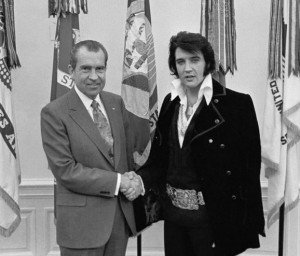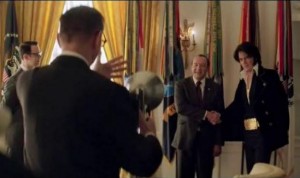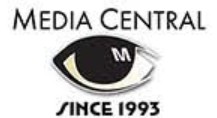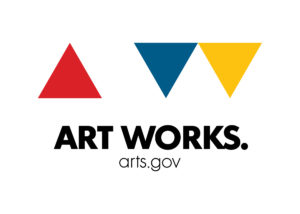by Flo Dwek; transcription courtesy of Word Wizards, Inc.
“On a December morning in 1970, the King of Rock ’n’ Roll showed up on the lawn of the White House to request a meeting with the most powerful man in the world, President Richard Nixon. Starring Academy Award-nominee Michael Shannon as Presley and two-time Academy Award-winner Kevin Spacey as Nixon, Elvis & Nixon tells the untold story behind this revealing, yet humorous moment in the Oval Office, forever immortalized in the most requested photograph in the National Archives.” — Film Notes, Elvis & Nixon
Elvis & Nixon pulsates with a quirky blend of history-in-the making, wacky humor and insightful glimpses of two American icons and polar opposites. There are riveting on-the spot-on performances by Kevin Spacey as Nixon and Michael Shannon as Elvis. Without resorting to blatant imitation or mockery, their on screen characters emerge with a true-to-life presence. A captivating back story that delves into Elvis’ simple, duty-bound desire to meet Nixon—colliding head on with the autocratic operations of the Nixon White House—works beautifully to underscore their differences. But as the climactic drama of their intimate Oval Office meeting unfolds—with deft portrayals of both men’s quirks, insecurities and vulnerabilities—their stark differences seem to give way to their commonalities. Watching these two legends jest and play off each other, one is drawn deeper into a strange, serio-comic realm that is surprisingly satisfying. In the end, Liza Johnson’s on-screen journey dazzles with mischief and fun, but amazes by its search for the truth.
WIFV: How did you first learn about the Elvis and Nixon meeting in December of 1970, and how did you get interested in making a film about the event?
JOHNSON: Oh, gosh. Well, I think I probably had seen that photograph sometime in my life, just because it’s very ambient–you know, like you go to get your car fixed and it’s up on the wall with the pin up calendar or something.
WIFV: Really famous!
JOHNSON: Yes. But the script was brought to my attention by one of the producers, Holly Wiersma, who sent it to me. She had offered the role of Elvis to Michael Shannon and then she sent it to me. And honestly, I don’t know why she thought of me exactly. I have to say that in my assessment, this project is quite different from my previous films and I have to think that either she felt like there’s a through line because all of them are very performance dependent. And, perhaps, based on my other films, she thought I could handle the performance element. Or she knew that I have a nice relationship with Mike, who’s also in my first film. Or both of those things.
So I don’t really know why she sent it to me. But that’s how the story came into my life. I didn’t write it and I think that it came into being because the writers–Joey Sagal, Hanala Sagal and Cary Elwes–were standing around looking at the picture [of Elvis and Nixon] and they couldn’t stop talking about it, and out of that enthusiasm—voila!
WIFV: Wow, that’s exciting.
JOHNSON: Yeah.
WIFV: And, you must be very happy with how it turned out.
JOHNSON: Oh, I’m so proud of them.
WIFV: That’s wonderful. So, Elvis and Nixon are clearly two iconic American opposites in this film, but by the time you finish watching you’re so struck, aren’t you, by the similarities between them and their vulnerabilities as well. So did you set out to actually depict that, or did it just evolve during the film?
JOHNSON: Oh, what’s such a nice thing to say. I’m especially intrigued by what you say about their vulnerabilities; and other people have used the term “insecurities” as well, which is interesting and maybe related–I don’t know. And I guess what I thought is that, to me, I think it’s a very delightful comedy of situation because the men are from such unlike worlds and they have such completely different styles of how they occupy the world. And therefore, it is funny all the time when they encounter each other.
But I did think that, you know, in a classical sense (I don’t mean this in any kind of mocking sense), nobody needs to see a big take down of Elvis Presley. Everyone’s already seen a big take down of Richard Nixon because that happened in history, and I never had any intention to mock them. So that’s certainly not what I mean, and I don’t think I do mock them.
WIFV: I understand—-the film certainly didn’t come across that way.
JOHNSON: But, you know, in the tradition of a classical satire, it doesn’t have to be about mocking the characters, but it should allow you to use humor to learn something about the operations of power–that you don’t need to satirize people who have no power, right? And it’s a way of looking at power. So I don’t know if I knew what would emerge about their power or their fame or their celebrity or their force in the world. I don’t know that I thought, ‘oh, their vulnerability is what’s going to come out,’ but I did think that some kind of new information or knowledge or way of thinking about their power was likely to emerge from the story.
WIFV: And it really coalesced that way–you did it.
JOHNSON: Well, thank you.
WIFV: I’d like to ask you about your direction for Kevin Spacey. Did you give any specific guidelines for his nuanced way of portraying Nixon without resorting to parody? And the same goes for Michael Shannon as Elvis. Neither of them really resorted to parody, did they?
JOHNSON: No, I don’t think so. And I think that’s why it’s interesting in the scene where the Elvis imitator comes in, because it allows you to see the difference between–you know–a real character-driven version of a character and then a more imitative, parodied version.
WIFV: Yes, that scene was maybe a little more farcical, right?
JOHNSON: Yeah. And I mean I definitely did give direction to Kevin and Michael, but I think, in a way, what you’re asking me is more about how did we work on the characters.
WIFV: Yes.
JOHNSON: And you know, with people at that level I would never tell Kevin, like, this is what you’re going to do, right? Because what I like to do is work with people that I have confidence in. I mean, in their own skills, and obviously, Kevin and Mike both just have mad craft and they know how to create a character. And so, to me, it’s not exactly like me giving him direction, it’s more like, how do we work toward something together.
And you know, he has to rely on me to think about, like, what is the tone of the movie going to be? And I have to rely on him to figure out, like, what do you need to know so that we get there. And so, yes, we did work on that; and we thought that there was no need to do a take down. We were committed to learning everything that we could about the physical work that he would need to do, or the voice, or the sort of postures, and the hunching and the lurching and all the other stuff. And I would say, probably even more importantly than that, was where Nixon was in his life then, and what has he already done, and what has he not done, and what was his personality like. What does he have in the works that he’s keeping secret from people?
What are these character elements? And those, like the physical work, I think, are really important and might be in common with what an imitator would learn, but those character questions are really about playing the story. And I think with someone like Kevin or Michael (I mean, Kevin is a great mimic, like he’s right up there with Rich Little as far as I’m concerned), if you give him a story he’s going to play the story.
WIFV: Yes. And it was very deepened by that, by those character elements that you mentioned. I’d like to know how your team of writers captured all the nuanced details of the story when there was no recording and they had only a little bit to go on, plus that interesting back story about Elvis’s friend and PR confidant, Jerry Schilling. How did they work it all out like that?
JOHNSON: Well, you know, I didn’t know them yet when they were in that process, but I have to presume a couple of things. One is just a level of research: for example, in the National Archives (where I’ll be tonight), they have the original letter that Elvis wrote to Nixon on the American Airlines flight in his little handwriting, and they read that more than one time, word for word in the script, so some of that just comes from a very traditional kind of archival research.
WIFV: Interesting.
JOHNSON: And then I think it was a lovely idea to make this “bromance” element with the Jerry Schilling character. Jerry’s book is an incredible document and it was the one that I used the most in my research for the film, because there’s been a lot of work done on Elvis. And for me, it was just a way to focus, to just let Jerry Schilling [be my guide]–that’s going to be my Elvis–the Elvis that comes from Jerry Schilling.
WIFV: So Jerry was your guide to Elvis’s character. And what was the name of his book?
JOHNSON: It’s called Me and a Guy Named Elvis.
WIFV: Oh, that’s a cool title.
JOHNSON: [The book] has a really beautiful voice–it’s very intimate and you can tell, you can feel, his love for Elvis at every moment. But also, you can feel his ability to analyze the situation and his knowledge of things that other people have thought about Elvis. And it’s actually very special, I think, the ability to go back and forth between the intimate and the analytic.
WIFV: He was a very empathetic character in the film.
JOHNSON: He’s an incredibly empathetic person. And I had the privilege of [working with him] since he consulted a lot with us on the movie and he cast Alex. He gave Alex [Alex Pettyfer, who plays the role of Jerry Schilling] access to his life and to observing him. He took Mike to Memphis. He took Mike to Graceland when it was closed. He took him to Lauderdale Courts, to the little bedroom that Elvis grew up in.
WIFV: That’s amazing.
JOHNSON: And he made himself available to me. And he even came on our set, which I wasn’t sure, initially, if it was a good idea, because I feel like actors really need to get [focused]—if they have too many voices informing them, it can be confusing. But the first time I met Jerry I knew that we could do that together because he spent his whole life around talent, and I knew he would do it as a collaboration with me, and do it through me as opposed to what some people would do, which is just take up their own space. And it was a real privilege and I’m really proud to call him my friend.
WIFV: That’s wonderful. I’d love to know how you actually managed to snag Kevin Spacey for the role of Nixon.
JOHNSON: Oh, gosh!
WIFV: How did that happen?
JOHNSON: I was pretty thrilled when that worked out. I think Kevin is interested in Nixon. He reminded me yesterday that he actually screen tested for FROST/NIXON. So he had actually worked on Nixon. He didn’t get the role, but he had tried to get the role in the past. And I think he knows a lot about heads of state, playing the President [On HOUSE OF CARDS], like thinking through power, you know. I think that’s enduringly interesting to him. And also, he told me the first time I ever talked to him, that he wanted to do it, in part, because of Michael. And I think that when you have craft at that level, it’s very exciting to get to think about really playing reactively off of another person that can take you at your own level. And so, at least according to Kevin, those were some of the reasons he said yes.
WIFV: So, he admired Michael, but did he know him well?
JOHNSON: No, but they probably had met, but it was more that nobody looks at performance more closely than other actors. Do you know what I mean?
WIFV: Yes.
JOHNSON: Like, it’s really true. You never see somebody that understands an actor’s work better than another actor.
WIFV: That’s very true. So let’s talk a moment about the look of the film-all those cool graphics and the detailed set design and the wonderful score. Were you happy with how it all came together and created a good sense of the late 60s and early 70s?
JOHNSON: Oh, absolutely. And I’m so flattered by how you characterize it. Yes, I guess the first department that I started working with was the cinematography. And we thought about the look of the movie, and in particular, about its lighting. We felt like it should be bright enough to support the humor but also dark enough to support the character depth. And so Terry [Terry Stacey, cinematographer] really found a lighting style that I think facilitated and supported that. The production designer, Mara LaPere Schloop, is delightful. And in a way, her department was almost like the fact checker on the movie. So in addition to creating this very beautiful world for us, they would also try to build the material world. I mean they would say, ‘You know what? This never happened.’ And [they did that] because that level of detail is necessary to make the world look historical.
WIFV: Yes, for credibility.
JOHNSON: And I also think the costume designer is quite wonderful–Peggy Schnitzer. And a lot of that was pre-decided–like we know what Elvis was wearing that day, and she had both of Elvis’s suits made from the original patterns that Elvis’s real tailor made for him. They’re cut in Mike’s size instead of Elvis’s size, but those are the suits cut from the same patterns.
WIFV: That’s very cool to know.
JOHNSON: And a lot of those [accessories], like the belts and Elvis’s clothes are just historically accurate.
WIFV: Even the gold buckles?
JOHNSON: Absolutely.
WIFV: Wow.
JOHNSON: But then I think the reason that the world feels like 1970 is actually [due to] the way that she dressed the background.
WIFV: Interesting!
JOHNSON: And actually, the hair [is important] as well. Adruitha Lee {Department Head Hairstylist] is an incredible talent. I call her a wig genius.
WIFV: All those sideburns!
JOHNSON: Yeah. And she actually won the “hair Oscar” the year before our show. She just is really talented with period hairstyles and stuff. And I think that part of the reason the world feels like that time period is not only because of the types of main characters and the way that they’re dressed, but every time you see anybody in the background, that’s when it really starts to feel like that period.
WIFV: It does. Even with the opening credits.
JOHNSON: Yeah.
WIFV: And the score. Those songs are amazing.
JOHNSON: Those came later, obviously, in the process. But I love the designer of the credits and we started going in a little bit of a Saul Bass direction; he just went nuts and I was so happy with his work. And the score is by Ed Shearmur; he really, really loves Elvis and he really thought a lot about what would be the right instrumentation and what would make it feel “capery” and fun but also reflect the period, both in its musical style and in its instrumentation.
WIFV: “Capery” is a very good word for that style. It was a kind of caper after all, wasn’t it?
JOHNSON: You know, I didn’t realize that, and then I heard Kevin talking about the project on Letterman before (when it was still Letterman), and when he described it, that’s when I realized it was a little bit of a caper.
WIFV: Yes, it is. It has that mischievous quality about it.
JOHNSON: Thank you.
WIFV: So as a final question, let’s talk a little bit about your successful trajectory as a female film maker. Do you have some important words to tell young women who are really trying to start out in this business?
JOHNSON: Oh, gosh. Well, I’m glad if you think I’m having a successful trajectory.
WIFV: Absolutely. It’s an honor to be here with you.
JOHNSON: The privilege is mine, and I guess, in a way, I think the advice I would give to young women is probably the same as I would give to young men. And I think I might be able to think of one gender-specific piece of advice, but I think the main thing to do is to just keep working, you know? And I think that a lot of people think that you have to wait for people to give you money or permission. But there’s actually always work that you can do. You know, writing is free. You can [even] shoot a video with your cell phone. And if you never work, then if you get an opportunity, you won’t know what to do with it. And I think that people sometimes don’t understand that if you aren’t working, then you aren’t ready for an opportunity if it should come.
WIFV: So basically, you’re saying, just work and stay proactive.
JOHNSON: Yeah, because that’s what gives you the knowledge and confidence about how to do anything or what you might want to do.
WIFV: Absolutely.
JOHNSON: And I really believe that it is a practice, you know, and if you’re not practicing then you don’t know what to do. You know what I mean?
WIFV: I do.
JOHNSON: It’s like, you can read a book about yoga, but it doesn’t make you enlightened and thin! Because it is hard to keep working, I think that the best thing you can do is try to have a community of other people who are also working.
WIFV: Like Women in Film and Video?
JOHNSON: Yes–anyone, frankly, that shares your eccentric interests. In my case, it often has been women and it often has been other people making film. But really, I think it’s a hard world and people always encourage you to do something else–like some wage earning thing. And that is necessary, you know, but I think that if you are around people who also share some of your creative interests, then you don’t feel as crazy. Everyone else will make you feel crazy– like you’re leaving money on the table or something. And that’s why you need a community of people that will just allow you to keep working.
WIFV: Yeah. To feel the love!
JOHNSON: Yeah, yeah!
WIFV: Well, thank you so much.
JOHNSON: Thank you.

A photo of the iconic meeting between Richard Nixon and Elvis Presley.

A recreation of the iconic meeting between Richard Nixon and Elvis Presley from the film Elvis & Nixon

Director Liza Johnson
















